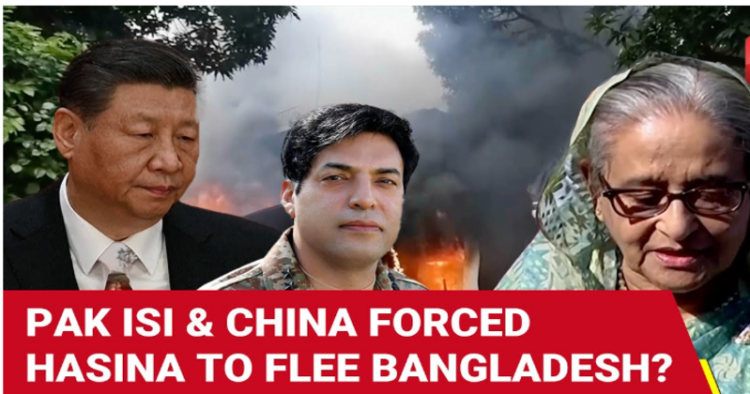NEW DELHI: Recent intelligence reports suggest a high-stakes conspiracy involving Pakistan’s Inter-Services Intelligence (ISI) and China to destabilize Bangladesh, resulting in the dramatic removal of former Prime Minister Sheikh Hasina. According to Indian intelligence sources, this elaborate operation was designed to install an anti-Indian regime in Dhaka and has involved substantial financial and strategic support from Beijing and Islamabad.
The turmoil in Bangladesh began with what was initially perceived as a student-led protest. However, it quickly escalated into widespread violence, leading to Hasina’s abrupt departure from the country. Diplomatic circles and analysts have increasingly viewed the situation as more than just a student uprising. Intelligence sources now reveal that the unrest was part of a coordinated effort by Pakistan and China to undermine the Awami League government and replace it with one more aligned with their interests.
Central to this alleged conspiracy is the Jamaat-e-Islami’s student wing, Islami Chhatra Shibir (ICS). Indian intelligence agencies report that the ISI provided substantial financial support to Jamaat-e-Islami earlier this year, with a significant portion of this funding coming from Chinese companies operating in Pakistan or directly from Beijing. This financial backing was used to fuel the violent protests that eventually toppled Hasina’s government.
Now the question comes to why China wants to oust Hasina?
The motivations behind China’s involvement are reportedly linked to Hasina’s foreign policy choices. Despite substantial Chinese investment in Bangladesh, including the construction of the Padma Bridge and other major infrastructure projects, Hasina’s administration maintained strong ties with India. Beijing, displeased with Hasina’s preference for India over China, is said to have sought to install a more compliant government in Dhaka.
Intelligence reports also indicate that radical Islamist groups, such as Harkat-ul-Jihad-al-Islami (Huji), have played a significant role in the unrest. These groups, backed by the ISI and trained in Afghanistan and Pakistan, have been accused of inciting violence and anti-India sentiment. The Jamaat-e-Islami and ICS reportedly used the pretext of advocating for democracy and human rights to gain international support and legitimize their actions.
The unrest has led to a rapid increase in demands for ‘independence’ and attacks on minorities within Bangladesh. The situation has created a volatile environment, raising concerns about the future stability of the country and its relations with India.



















Comments